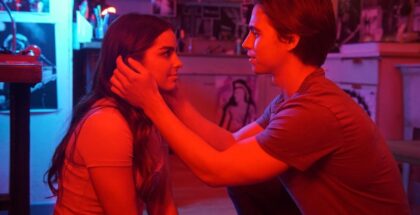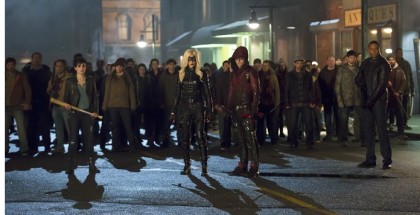Yannick: An engagingly absurd comedy
Review Overview
Absurdity
5Performances
6Chuckles
7Matthew Turner | On 20, Apr 2024
Cast: Raphaël Quenard, Pio Marmaï, Blanche Gardin, Sébastien Chassagne
Certificate: TBC
Yannick is the 12th feature by the prolific French filmmaker Quentin Dupieux, who has effectively created his own sub-genre thanks to his distinctive and welcome fondness for blackly comic, surreal absurdity. While not on the level of Deerskin (2019), Mandibles (2020) or Incredible But True (2021), his latest film is still an enjoyable way to pass an hour (short running times are also Dupieux’s thing), thanks to an engaging premise that delivers a few chuckles and leaves you with food for thought.
Set in present-day Paris, the film opens with three actors – Sophie Denis (Blanche Gardin), Paul Rivière (Pio Marmaï) and William Keller (Sébastien Chassagne) – performing boulevard adultery play Le Cocu (The Cuckold) to a clearly bored, less-than-half-full theatre. After a few minutes, disgruntled garage attendant Yannick (Raphaël Quenard) decides he’s had enough, and he stands up and starts complaining that he’s not enjoying the play, especially as it’s his only night off and he’s already travelled for an hour to be there.
Dumbfounded and then annoyed, the actors ask Yannick to leave, which he initially does, but when he hears them mimicking him to the audience, he returns, armed with a gun, and proceeds to take the whole theatre hostage. Then he requests a laptop and announces that if the audience will bear with him, he’ll write a better play and the actors can perform that instead.
That simple premise is more or less the entire movie – a single joke taken to its logical extreme. At first glance, it might make the film look a little too one-note, but Dupieux uses the central idea in several interesting ways, eschewing the obvious option of a straightforward hostage thriller in favour of something altogether more intriguing.
For one thing, there’s some enjoyable wish fulfilment going on – most theatregoers will have wished at some time or another that they could stand up, say “no, thank you, I’m not enjoying this” and walk out of a bad play. But that idea in itself raises the interesting question of what we want out of a play (or a movie, for that matter) in the first place – Yannick complains that it hasn’t stopped him thinking about his less-than-satisfactory life, so presumably all he wants is escapism, but the audience is left questioning their own relationship to art too.
Similarly, the film seems to suggest that comedy – no matter how poorly written or performed – is ultimately “better” than pompous drama, because at least it elicits a positive reaction. Yannick, in fairness, is portrayed as a man of simple tastes, so perhaps Dupieux doesn’t intend to criticise French theatre quite that harshly, but it’s also worth pointing out that the film largely sides with Yannick’s point of view.
Quenard (who made his feature debut in Dupieux’s Smoking Causes Coughing, last year) is very good as Yannick, keeping both fictional and real-life audiences on side throughout with his low-key amiability and getting a surprisingly moving moment towards the end that speaks to the creation of art. Pio Marmaï is excellent as the more outspoken of the actors – his change of character when circumstances shift is very telling and introduces a note of genuine tension.
In short, this is an engagingly absurd comedy with several funny lines and strong performances. And if you’re a Dupieux fan and Yannick doesn’t really work for you, then don’t worry – his new film, The Second Act, is opening Cannes 2024.



















